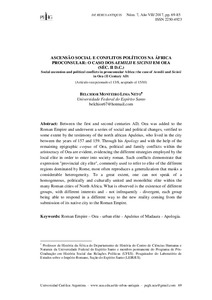Please use this identifier to cite or link to this item:
https://repositorio.uca.edu.ar/handle/123456789/7360| Título: | Ascensão social e conflitos políticos na África proconsular : o caso dos Aemilii e Sicinii em Oea (Séc. II d.c.) Social ascension and political conflicts in pronconsular Africa : the case of Aemilii and Sicinii in Oea (II century AD) |
Autor: | Lima Neto, Belchior Monteiro | Palabras clave: | HISTORIA ANTIGUA; HISTORIA SOCIAL; HISTORIA POLITICA; IMPERIO ROMANO; LITERATURA LATINA; Apuleyo, ca. 125-ca. 180 | Fecha de publicación: | 2017 | Editorial: | Pontificia Universidad Católica Argentina. Facultad de Ciencias Sociales. Departamento de Historia | Cita: | Lima Neto, B.M. Ascensão social e conflitos políticos na África proconsular : o caso dos Aemilii e Sicinii em Oea (Séc. II d.c.) [en línea]. De Rebus Antiquis. 2017, 7 Disponible en: https://repositorio.uca.edu.ar/handle/123456789/7360 | Resumen: | Resumo: Entre os séculos I e II d.C., Oea foi agregada ao Império Romano e passou por uma série de modificações sociais e políticas, verificadas, em alguma medida, por meio do testemunho do norte-africano Apuleio, que viveu na cidade entre os anos de 157 e 159. Por intermédio de sua Apologia e com o auxílio do corpus epigráfico remanescente de Oea, observa-se a existência de conflitos políticos e familiares no interior da aristocracia oeaense, evidenciando as diferentes estratégias empregadas pela elite local no intuito de se inserir na sociedade romana. Tais conflitos demonstram o quanto a expressão “elite citadina provincial”, comumente utilizada para denominar a ordem dos decuriões das diferentes regiões dominadas por Roma, reproduz, na maioria das vezes, uma generalização que encobre uma considerável heterogeneidade. Em grande medida, não se pode falar de uma elite homogênea, política e culturalmente unida e monolítica no interior das inúmeras cidades romanas do Norte da África. O que se observa é a existência de diferentes grupos, com interesses distintos e – não raras vezes – divergentes, podendo cada grupo responder de forma diversa à nova realidade advinda da submissão de sua cidade natal ao Império Romano. Abstract: Between the first and second centuries AD, Oea was added to the Roman Empire and underwent a series of social and political changes, verified to some extent by the testimony of the north african Apuleius, who lived in the city between the years of 157 and 159. Through his Apology and with the help of the remaining epigraphic corpus of Oea, political and family conflicts within the aristocracy of Oea are evident, evidencing the different strategies employed by the local elite in order to enter into society roman. Such conflicts demonstrate that expression "provincial city elite", commonly used to refer to elite of the different regions dominated by Rome, most often reproduces a generalization that masks a considerable heterogeneity. To a great extent, one can not speak of a homogeneous, politically and culturally united and monolithic elite within the many Roman cities of North Africa. What is observed is the existence of different groups, with different interests and - not infrequently - divergent, each group being able to respond in a different way to the new reality coming from the submission of its native city to the Roman Empire. |
Cobertura Espacial: | AFRICA | URI: | https://repositorio.uca.edu.ar/handle/123456789/7360 | ISSN: | 2250-4923 | Disciplina: | HISTORIA | Derechos: | Acceso Abierto | Fuente: | De Rebus Antiquis. 2017, 7 |
| Appears in Collections: | DRA - 2017 nro. 7 |
Files in This Item:
| File | Description | Size | Format | |
|---|---|---|---|---|
| 1371-4774-1-PB.pdf | 301,01 kB | Adobe PDF |  View/Open |
Page view(s)
151
checked on Apr 30, 2024
Download(s)
358
checked on Apr 30, 2024
Google ScholarTM
Check
This item is licensed under a Creative Commons License

